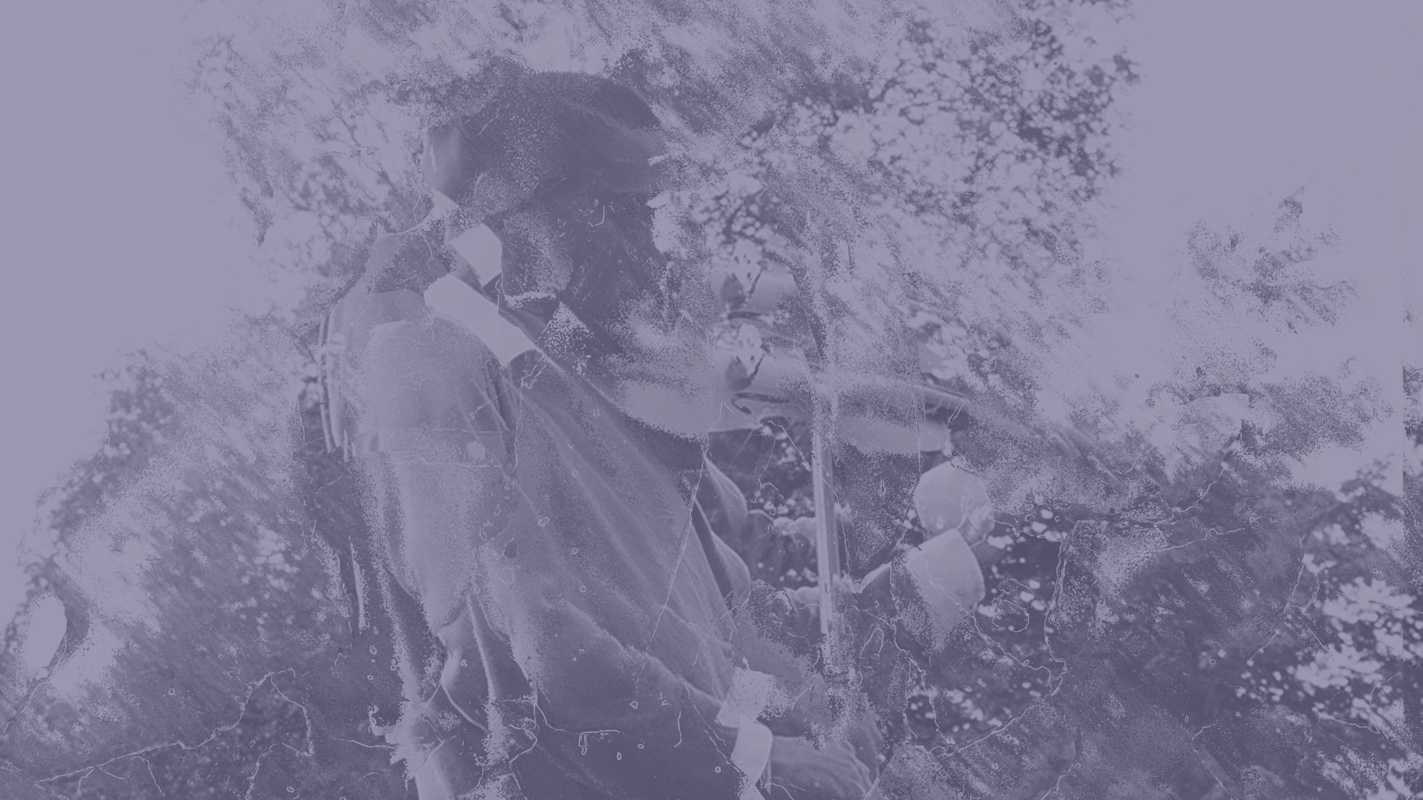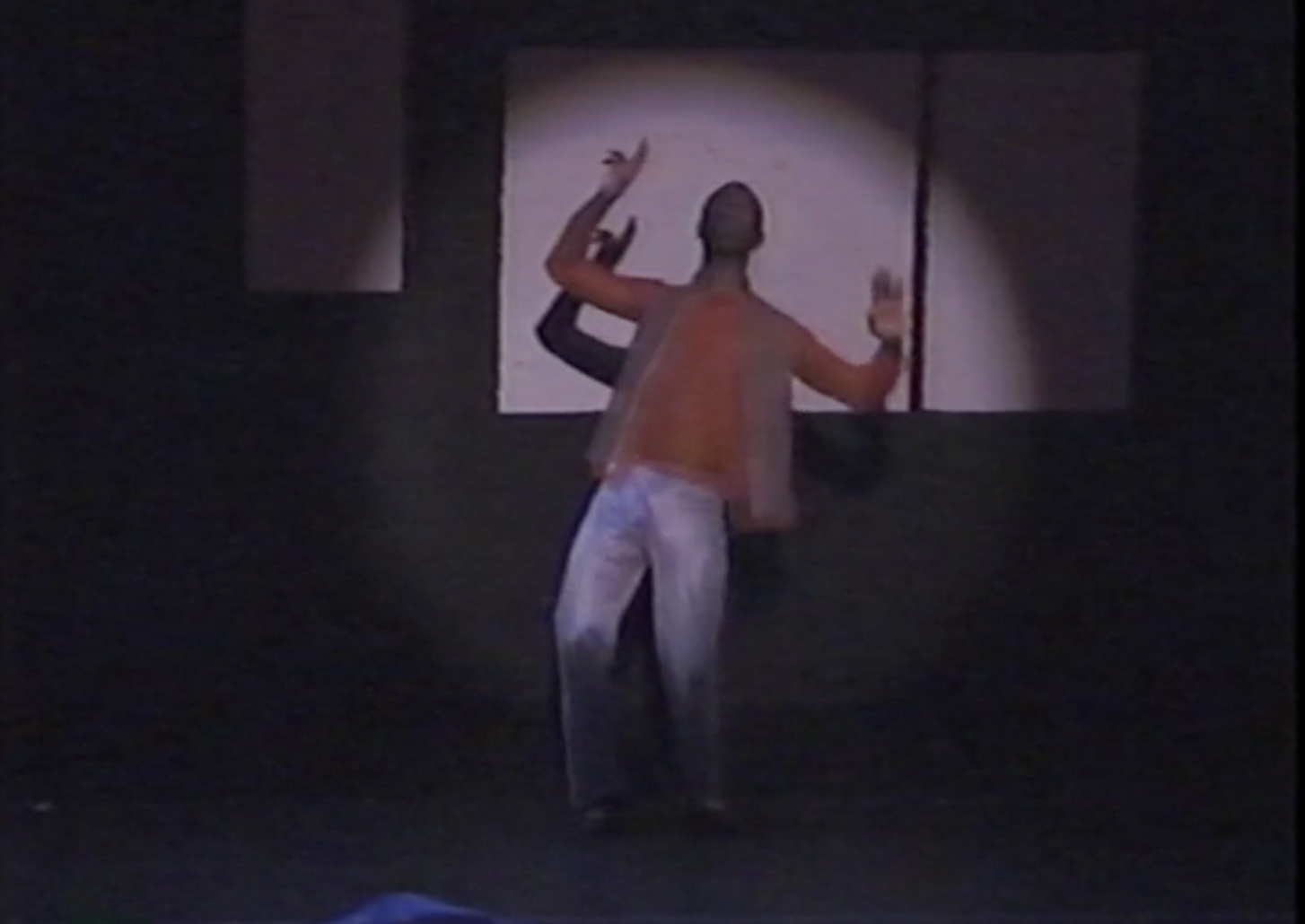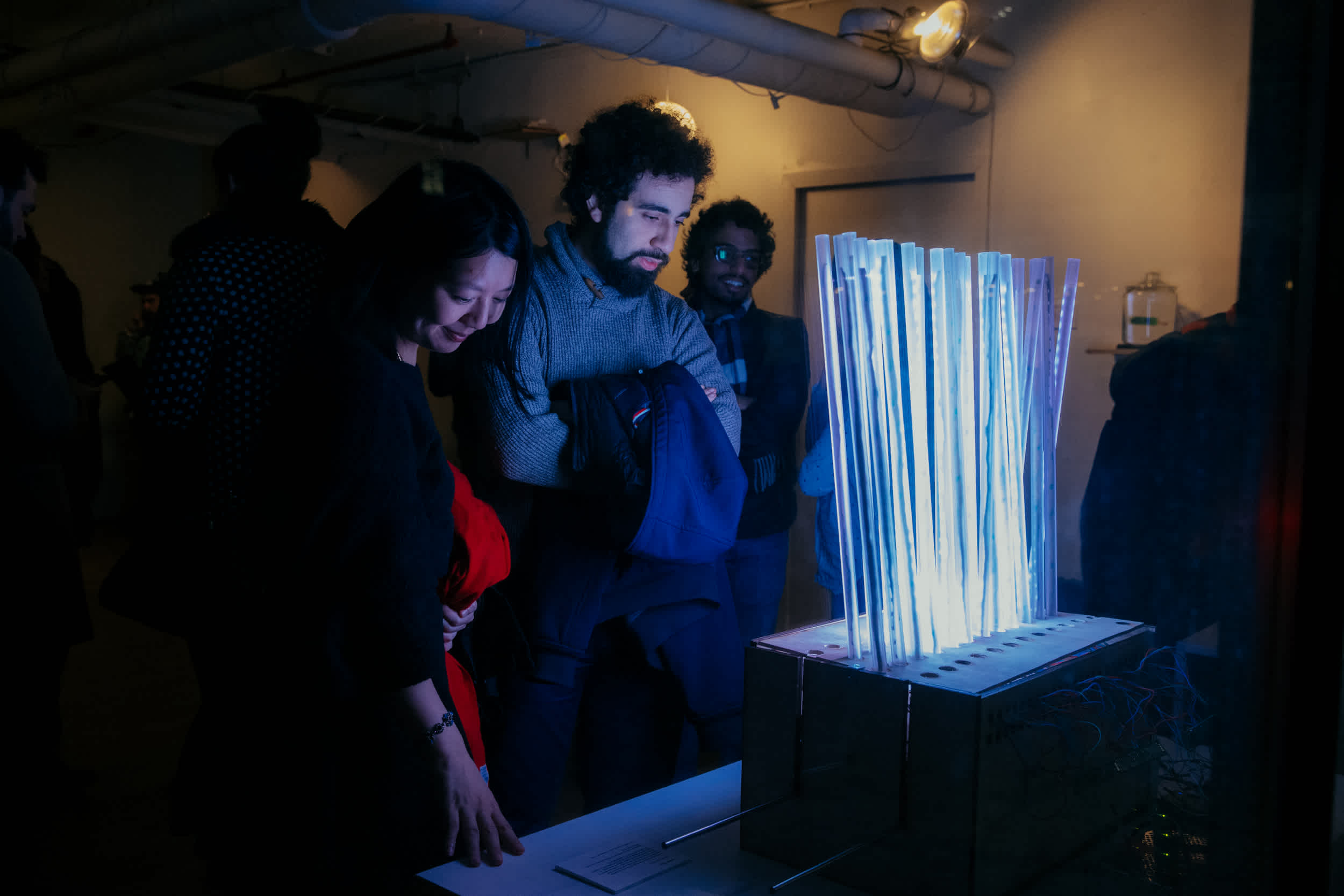
On View: September 27-September 28, 2023
Collapsable Hole (155 Bank St, New York, NY 10014)
Time:
7pm, Free with RSVP
The Kitchen L.A.B. Research Residency primary researcher Romi Ron Morrison hosts a roundtable discussion with artist Kumi James and the collaborative duos of Mendi + Keith Obadike and Oxana Chi & Layla Zami that will explore Morrison’s research on the graphic scores and personal life of Julius Eastman.
To culminate their residency with The Kitchen, Morrison will create a graphic score inspired by their research on Eastman’s use of graphic notation: the artist has commissioned this group of invited artists to develop a composition in response to their forthcoming score. On September 27, Morrison will host an in-person event comprising a conversation about the project with the contributing artists and a collaborative, movement-based performance by Chi with live-music by Zami.
A recording of the program will air on Montez Press Radio the following day, September 28, at 6pm EST, as part of the series Instruments of the Black Goey Universe On Air.
This project is part of The Kitchen L.A.B. Research Residency x Simons Foundation x School for Poetic Computation.
Publication Launching September 2023, Online and In Print
In September, Morrison will launch a multimedia “song book” inspired by their research on the graphic scores, personal life, and musical patterns of the late composer Julius Eastman. Song Book: The Quotient of Desire will incorporate new graphic scores produced by Morrison alongside critical texts and a selection of photographs emerging from the artist’s research.
The title Song Book gestures toward Eastman’s infamous dispute with the minimalist composer John Cage. Eastman performed an iteration of Cage’s canonical work Song Books with the S.E.M. Ensemble at The University of Buffalo in 1975—a performance that was deemed inflammatory for its use of nudity and its emphasis on queer desire. The performance and its reception marked a pivotal turning point in the artist’s career: from then on, Eastman’s identity as a Black gay man became a critical focus in his work, expressed in forthcoming compositions like Evil N, Crazy N, and Gay Guerrilla (all 1979). Ultimately, the dispute and Eastman’s unapologetic assertion of his identity contributed to his ostracization from much of the white academic music world.
In their own song book, Morrison reckons with Eastman’s displacement and sets out to map the social landscapes and physical geographies that the late artist frequented in New York. This mapping holds Eastman's patterns of desire in tension with computational models deployed by New York City’s Urban Planning Department. This work asks, “How might Eastman’s errant patterns modulate computing in excess of enumeration?" Morrison’s Song Book will take the form of a printed publication and will also be published digitally, alongside their essay for The Kitchen’s online publication, On Mind.
Song Book: The Quotient of Desire
BIOS
Romi Ron Morrison (they/them) is an interdisciplinary artist, researcher, and educator. Their work investigates the personal, political, ideological, and spatial boundaries of race, ethics, and social infrastructure within digital technologies. Using maps, data, sound, performance, and video, their installations center Black diasporic technologies that challenge the demands of an increasingly quantified world—reducing land into property, people into digits, and knowledge into data. Morrison has exhibited work and given talks at numerous exhibitions, conferences, and workshops around the world including Transmediale (Berlin), ALT_CPH Biennial (Copenhagen), the American Institute of Architects (New York), Museum of Contemporary Art (Chicago), Haus der Kulturen der Welt (Berlin), Queens Museum (New York), and the Walker Museum of Art. They have been in residence at Eyebeam Center for Art + Technology, New York University (ITP), The Joan Mitchell Foundation, and FemTechNet. Their writing has appeared in publications by MIT Press, University of California Press, Catalyst: Feminism, Theory, Technoscience, and Logic Magazine. They are currently an Assistant Professor in the Design Media Arts program at UCLA in Los Angeles.
Oxana Chi (she/her) is a Nigerian-German dancer, choreographer, curator, writer, filmmaker, educator, and trendsetter. Her work explores how our present is built upon in/visible remnants from the past, and its porous relation to our futures. Her rich multidisciplinary repertoire includes commissioned works for Humboldt-University (Berlin) and for the Leo-Baeck-Institute (NYC/Berlin). International tour history includes Jack Crystal Theater at NYU, Volksbühne Berlin, HAU, Societätstheater Dresden, Delhi International Queer Theatre & Film Festival, SIPA Festival Surakarta, University of Ghana, Goldsmith University, among many others. Honors, residencies and awards include: PSi 2023 Bursary, Abrons Arts Center AIRspace Grant 2017-2018, Ambassador of Peace DOSHIMA 2016, and being listed in The Dance Enthusiast’s A to Z of People Who Power the Dance World (NYC 2018). Her choreography and film works are discussed in several publications and university syllabi. She was a Curator for the International Human Rights Art Festival and a guest faculty in the Dance Department at NYU.
Kumi James (she/her), aka BAE BAE, is a DJ/producer, sound artist, and filmmaker born and raised in Los Angeles. Her sound design practice explores the permeability of identity, the liberatory potential of Black culture(s), and possibilities for personal and collective healing. James’ uncanny sonic assemblages and dj mixes provoke muddy flows of knowing through the body, senses, and memory. She curates LA's beloved underground party, Hood Rave, and hosts a monthly radio show on NTS Radio called Hypersensitivity.
Mendi + Keith Obadike make music, art and literature. Their early works include The Sour Thunder, an Internet opera (Bridge Records), Crosstalk: American Speech Music (Bridge Records), Black.Net.Art Actions, a suite of new media (internet art) works (published in re:skin on M.I.T Press), Big House / Disclosure, a 200-hour public sound installation (Northwestern University), Phonotype, a book & CD of media artworks, and a poetry collection, Armor and Flesh (Lotus Press). They have contributed sounds/music to projects by wide range of artists including loops for neo-soul singer D'Angelo's first album and a score for playwright Anna Deavere Smith at the Lincoln Center Institute. They were invited to develop their first "opera-masquerade" by writer Toni Morrison at her Princeton Atelier. Their recent projects include a series of large-scale sound art works: American Cypher at Bucknell University and The Studio Museum in Harlem, Blues Speaker (for James Baldwin) at The New School in New York, Free/Phase at the Chicago Cultural Center, Sonic Migration at Scribe Video Center and Tindley Temple in Philadelphia, and Fit (the Battle Of Jericho) at The Metropolitan Museum of Art in New York. Their other honors include a Rockefeller New Media Arts Fellowship, Pick Laudati Award for Digital Art, a New York Foundation for the Arts Fellowship in Fiction, and the Louis Comfort Tiffany Biennial Award. Their intermedia work has been commissioned by The NY African Film Festival and Electronic Arts Intermix, The Yale Cabaret, Whitechapel Art Gallery (London), and The Whitney Museum of Art, among other institutions. Their music has been featured on New York and Chicago public radio, as well as on Juniradio (104.5) in Berlin. They are currently exhibiting in the group show I Was Raised On The Internet at the Museum of Contemporary Art Chicago and developing new work as artists in residence at the Weeksville Heritage Society in Brooklyn, NY.
Keith (he/him) received a BA in Art from North Carolina Central University and an MFA in Sound Design from Yale University. He is a professor in the Department of Art at Cornell University. Mendi (she/her) received a BA in English from Spelman College and a Ph.D. in Literature from Duke University. After working as a Cotsen Postdoctoral Fellow at Princeton University, she became a poetry editor at Fence Magazine and is currently an associate professor in the Department of Humanities and Media Studies at Pratt Institute. Mendi and Keith also serve on the boards of Rhizome and The Vera List Center for Art and Politics.
Dr. Layla Zami (she/her) is an interdisciplinary scholar and artist working with music, sounds, poetry, and theater. She is currently Postdoctoral Researcher in Performance Studies at Freie Universität Berlin and a Resident Artist with Oxana Chi Dance & Art. Born in Paris in 1985, she is proudly rooted in a Jewish-European and Afro-Caribbean-Indian heritage, and blossoms on tour with her wife. The duo has gratefully and gracefully performed in universities, theaters, and festivals in Europe, Africa, Asia and North America. The author of Contemporary PerforMemory (2020), she holds a PhD in Gender Studies (Humboldt-University) and a Diploma in Classical Saxophone (Conservatoire du Mans). During her NYC years, Zami was Adj. Associate Professor of Humanities and Media Studies and Co-Chair of Black Lives Matter at Pratt Institute in NYC, and a LABA Fellow at the 14th Street Y Theater.
FUNDING SUPPORT & CREDITS
The Kitchen L.A.B. Research Residency is generously supported by the Simons Foundation, whose mission is to advance the frontiers of research in mathematics and the basic sciences. The Foundation’s Science, Society and Culture division seeks to provide opportunities for people to forge a connection to science—whether for the first time or a lifetime. Through their initiatives, they work to inspire a feeling of awe and wonder, foster connections between people and science, and support environments that provide a sense of belonging.
The Kitchen’s programs are made possible through generous support from annual grants from Bloomberg Philanthropies, Helen Frankenthaler Foundation, Howard Gilman Foundation, The Andrew W. Mellon Foundation, Mertz Gilmore Foundation, Simons Foundation, Ruth Foundation for the Arts, and Teiger Foundation; and in part by public funds from New York City Department of Cultural Affairs in partnership with the City Council and New York State Council on the Arts with the support of the Office of the Governor and the New York State Legislature.



